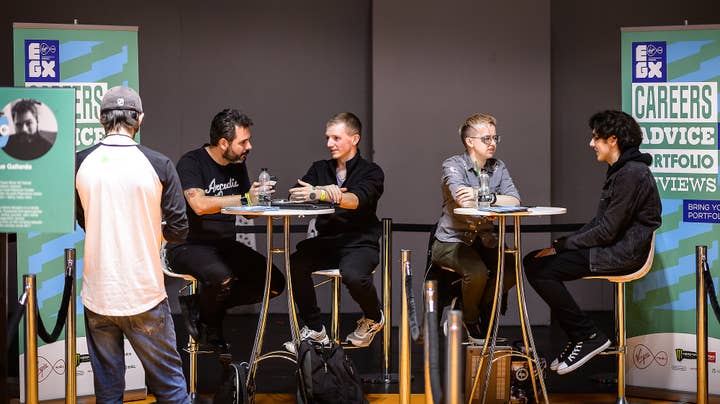How to make your video games resume, portfolio, and job application stand out
The GamesIndustry.biz Academy shares tips on how to overcome the first barriers between you and the job you want
It doesn't matter if you're a graduate fresh out of university or an industry veteran with decades of experience; creating a great first impression is critical if you've any hope of securing that dream job.
It's easier said than done, though, isn't it? Particularly if you're relying on nothing but your CV and a covering letter to help you get that foot in the door.
Against such fierce competition, it's more important than ever to ensure your CV shines and catches the eye of recruiters for all the right reasons. So if you're new to the industry or simply looking to make a change, we spoke to some of the video game industry's top recruiters to get their tips on how best to make your CV and portfolio stand out from the rest.
- Tailor your resume for the job you're applying for
- Keep it short and simple
- Check - and then double-check - if a covering letter is required
- Perfect your portfolio
- Carefully and thoroughly read the application before you fill it in...
- ...And then again when you've finished it
- Use the STAR technique to evidence your experience
- Keep in touch with your college professors and lecturers
- 11 things you can do now to spring clean your CV and portfolio
Tailor your resume for the job you're applying for
Almost every respondent we spoke to suggests that rather than sending out masses of generic CVs, candidates might have better luck if they tailor their resumes for each individual job. While that might feel a little labor-intensive, it'll showcase your attention to detail, as well as help ensure you can best demonstrate how you meet every criterion detailed on the job specification.
"It's not enough to just list skills like 'being a team player' - that's equivalent to 'breathing air'" Sezzy Beasley, Improbable

Recruiters are always happy to see strong evidence of collaboration and teamwork, as well as critical thinking, problem-solving, and -- particularly in a pandemic -- evidence that applicants can manage their own time, especially when working remotely.
"It's not enough to just list skills like 'being a team player' -- that's equivalent to 'breathing air'," advises Sezzy Beasley, who works at Improbable Games Canada as an HR business partner. "I recommend instead you write these skills down [and explain] how you have used them in your past work experience."
Most hiring managers recognize that people will reuse covering letters and CVs, and completely understand how exhausting it can be to constantly battle each organization's unique recruitment process. However, that means even if you're applying to numerous studios, you need to ensure every application you send is tweaked and personalized for each individual prospective employer.
That said, don't be scared of detailing why you're passionate about a company or video game, either. Showing off your knowledge about a particular game or series can help demonstrate your enthusiasm more than a cold list of your skills ever could.
Keep it short and simple
Skyhook Games' managing director, David Harper, has one key piece of advice: keep it simple.
"Tell me the main things I need to know at the top of the CV without making me hunt for the details," he says. "I like to see a brief summary at the top of a CV to give me a quick flavor of the applicant to see if I want to read further -- TL;DR if you will.
"Ask yourself if what you are including would be a benefit to the employer reading it. Do they need to know you got your 5m swimming badge for instance?"David Harper, Skyhook
"Keep it relevant and to the point. I appreciate this is more difficult for people just starting their careers with less material to draw from, but ask yourself if what you are including would be a benefit to the employer reading it. Do they need to know you got your 5m swimming badge for instance?"
Coatsink management assistant Emma Blenkinsop agrees and suggests all candidates "declutter" their resumes, keeping their CVs short and concise, well-spaced, and no more than two pages long. She also recommends you "choose a nice, easy-to-read font and use page break lines."
"If it's easy on the eye we're not immediately put off and are more inclined to want to keep reading," Blenkinsop adds.
Oh, and you might want to rethink those cute little bar graphs and pie charts, too.
"We hate those meaningless graphics [that] show us how well you know Unity or how good you are with Photoshop. They are just a space-filler and don't tell us anything -- skip it!"
Check - and then double-check - if a covering letter is required
It might seem like a small oversight, but if a job application asks for a covering letter, make sure you add one -- and personalize it to the organization you're hoping to join. Max Downton, senior brand manager at Splash Damage, admits he may discard your application if you've forgotten to add one.
"We hate those meaningless graphics [that] show us how well you know Unity or how good you are with Photoshop"Emma Blenkinsop, Coatsink
"If I was hiring for a low-applicant volume role, then maybe I'd care less about it, but when I get inundated with hundreds of CVs you have to show me your personality, and you have to show me how you stand out. A CV on its own is incredibly difficult to stand out with," he says.
Abbie Dickinson, brand communication manager at Rebellion, agrees, adding that applicants that take the time to explain why they want to work for Rebellion as opposed to any other studio "really does make [them] stand out."
Perfect your portfolio
Coatsink's Blenkinsop highlights that "it's all about the portfolio." It needs to showcase your talents, so make sure everything you include emphasizes your skillset.
If you're applying for a technical role, make sure the examples on your website or showreel are as recent examples as they can be, and -- if you're starting out -- feature not just your university projects, but your passion projects, too.

"It's important to showcase your work with great images and provide insight into your role on the project," advises Improbable's Beasley. "Depending on the position you're applying for, your portfolio might need in-depth case studies, so be sure to see what the job post specifically asks for."
If you're looking to make a lasting impression, however, Downton says that as well as a sizzling showreel, you need to evidence in your portfolio why you should be interviewed over other applicants, too. A tall ask, perhaps, but anticipating some of these questions might give your application an edge.
And don't worry if you think your university portfolio looks a little bare; Skyhook's Harper thinks you can add value by including examples of work that you complete outside of your studies.
"There may be hundreds of people who have very similar course work, but very few that will have taken what they learned and decided to create something based on that in their own time," he says. "These are the people that really stand out for me."

Your portfolio needs to clearly illustrate not only your experience but what disciplines you're interested in, too. Rebellion's Dickinson says that having a portfolio that includes "environments and characters and props and textures" might hint at a "lack of specialization."
Charmaine Clavier-St John, head of people at Hutch, agrees and suggests that developers tailor their portfolios according to their specialism:
- Portfolios for engineers should include personal projects, particularly if you are starting out in your career. Evidence of making a small game, contributing to a modding community, and/or working on Github code are signs of your proactive steps that can help "swing an application."
- Portfolios for artists should be kept up to date with relevant pieces and your very best work. She advises artists focus on a smaller number of excellent pieces rather than too many, and ensure their portfolios have a "crisp and visually pleasing" layout, too.
- Portfolios for UI/UX applicants should not just include great examples of projects, but also your "process, workflow, wireframe," too. The output is important, she says, but "that process is essential to helping you stand out amongst your peers."
Carefully and thoroughly read the application before you fill it in...
First up: are you sure you have the necessary skills and experience to apply? Don't waste your or your recruiter's time by applying for something you're wholly unqualified for.
"I'm unlikely to consider CVs that show the candidate has not read the job post thoroughly and properly and doesn't have the relevant experience or required skills," admits Improbable's Beasley. "If the post is for a senior position and asking for 8+ years of experience and CV lists less than three years, I'm more likely to pass on it.
"You can apply for a job if you're close to the requirements but if you're not, randomly applying for any and all openings won't help you in the long run and may leave a bad impression to the recruiter or hiring manager."

Downton further suggests that you avoid focussing on the obvious details; if you're applying for a video editor role then it's expected you'll have incredible editing skills, so there's no need to labor those points. Instead, dedicate time to the additional things that "might make you stand out."
It's also important to ensure your style and experience fits with what you know of the project, so if you submit a CV that lacks experience or a showreel that doesn't match a studio's signature art-style, for example, it'll likely be discarded.
Most of the time, studios are looking for independent thinking who can creatively solve problems and are happy to get stuck in. As Hutch's Clavier-St John puts it: "We want to see that hunger to build games, to get them in the hands of players and to make an impact. It really is as much about aligning with a studio's culture as it is about hard skills."
...And then again when you've finished it
"I don't care how good your previous work experience is, if you can't be bothered to check your CV or covering letter for spelling mistakes, I have no confidence you have the attention to detail in the rest of your work," admits Skyhook's Harper.
Don't be afraid to let your personality shine through
To be noticed by the people reading your application or CV, your personality must come through. After all, your resume is initially the only thing the recruiter has to make a first impression about you, so it might be prudent to communicate how an organization's values align with your own beliefs.

"Standing out is about showcasing your personality," agrees Downton, who thinks you should even use your CV to talk about yourself to help hiring managers notice you.
"There are lots of people out there who can do the job you're applying for, so it's about showing why you're different," he says. "It's about showing what you'd be like to work with, while also demonstrating your proficiency for the role. If you can do both of those in your application you're well on your way to an interview."
Clavier-St John says no recruiter just wants to see lists of technologies, frameworks, and tools on your resume. Talk about your personal contributions, what part of your projects you really enjoyed -- and why -- so that the assessor can get an idea of who you are. "Understanding what you contributed to previous projects really helps us to frame your experience," she says."We want to see your passion and drive from the get-go, so don't underestimate the importance of a well-done CV."
Use the STAR technique to evidence your experience
Hutch's Clavier-St John also has a star tip -- literally -- for those looking to stand out in applications or interviews; memorize the handy mnemonic device, STAR.
If you're asked to provide examples or evidence in your application, think STAR and talk about the Situation, Task, Actions, and Result.
"Talk about specifics, use real-world examples and the impact that you had"Charmaine Clavier-St John, Hutch
- Situation: Start by describing the example situation you found yourself in
- Task: discuss the task you were assigned
- Actions: detail what you did to achieve your task
- Result: detail what the result was. Did you achieve your task? If so, how? If not, what lessons did you learn? Make sure you refer specifically to what you've done in roles and the impact you made, as that's equally as important
You're not limited to using it to describe your industry experience, either; use STAR when describing any relevant experiences to date, be they from a studio, university, or any work experience that demonstrates applicable transferable skills.
"Talk about specifics, use real-world examples and the impact that you had," she advises.
Keep in touch with your college professors and lecturers
Some studios have links with local schools, colleges, and universities -- so use them. Take Rebellion, for example. While it does advertise vacancies on the usual channels -- "we've seen our applications increase since we've started talking about our studio more [publically]," Dickinson says -- the studio also works with local education providers in order to attract, support, and retain the next generation of video game developers.

Improbable Games Canada employs a similar system.
"We care about establishing relationships with post-secondary institutions and game dev associations across the country, and connect with STEM programs that support underrepresented groups to encourage diversity and inclusive recruitment as much as possible," explains Beasley.
It's through these links the company specifically targets newly-qualified or early-career devs and notifies them of recruitment opportunities, perhaps before they are advertised on social media or the company's website. Therefore, it's important to keep an up-to-date resume ready and attend local events and talks when you can, as you never know when a chat with a former lecturer or professor turns into a job opening.
Don't forget about intern schemes, too. Coatsink has "a number of our employees [that] started as interns" as part of university-linked internship schemes.
11 things you can do now to spring clean your CV and portfolio
Think you're ready to apply for that dream job? Here are 11 simple things you can do right now to smarten up your CV and/or improve your chances of getting called back for an interview:
Ensure your font sizes and bullet points are consistent -- show you take pride in attention to detail
- Make sure any links in your applications work.
- Ensure your website is accessible on mobile and desktop devices, or make use of websites like GitHub and ArtStation.
- Arrange your experience in reverse-chronological order, starting with your newest project at the top.
- Recent graduates should reference game jams and extracurricular activities.
- Double-, triple-, and then quadruple-check your spelling and grammar -- especially the name and pronouns of your recipient and the company's name.
- Put your specific skills in bold or italics so they stand out on the page, be it on your resume or your website.
- List your skills and the tools you can use in a white font at the bottom of your CV; it'll be invisible to the naked eye but may help it get noticed when recruiters are searching for keywords in hopeful applications.
- Ensure your font sizes and bullet points are consistent -- show you take pride in attention to detail.
- Before you submit your freshly revised CV, ask a friend to look over it to double-check it's accurate and makes sense.
- If you're drafting an application, bullet-point how you think you fulfill the person/role specification, addressing every criterion clearly and separately.
- Don't expect speculative applications to open many, if any, doors -- most of the time, they'll be ignored.
More GamesIndustry.biz Academy guides to Working in Games
Our guides to working in games cover various perspectives, from hiring to retention, to landing the job of your dream or creating the right company culture:

